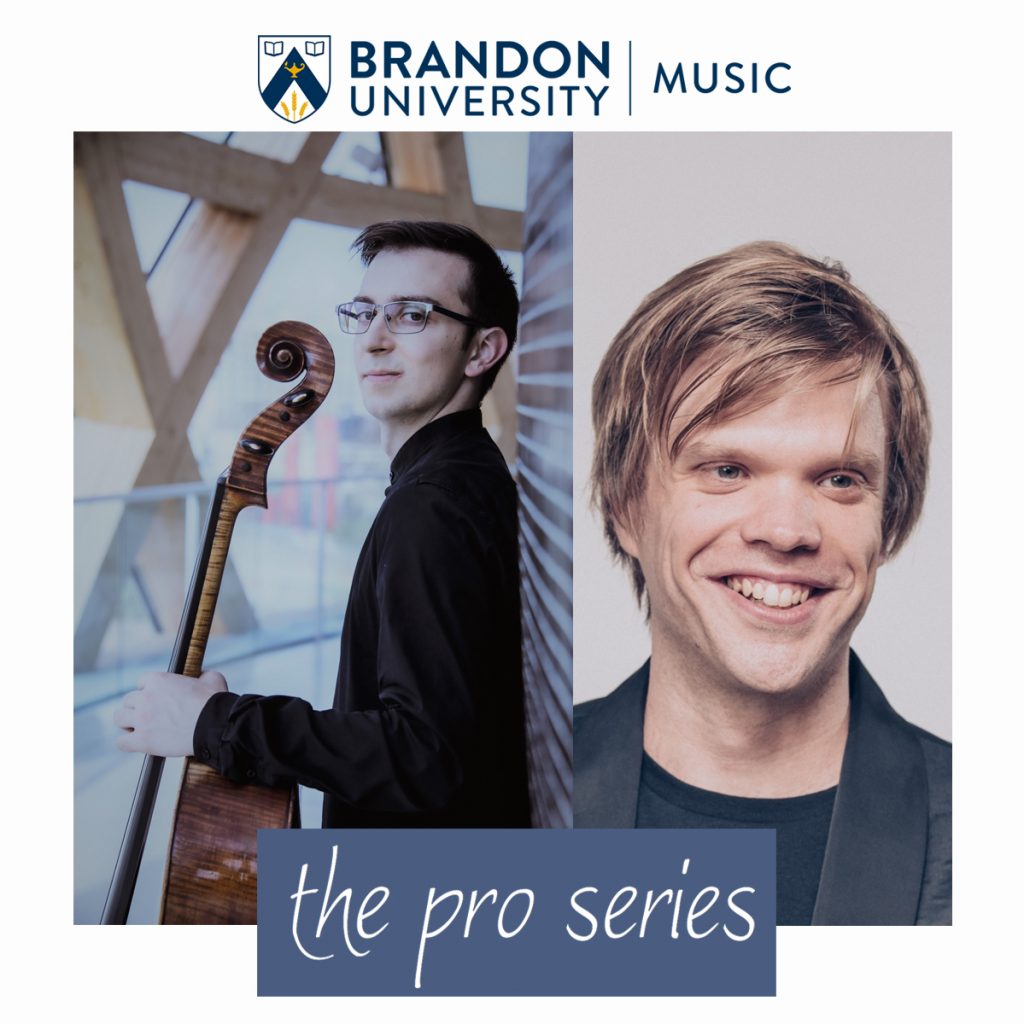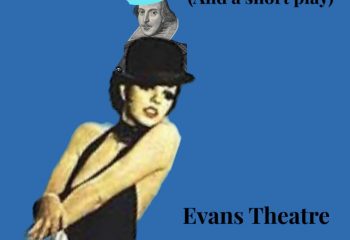
- This event has passed.
Pro Series: E-Gré winner Julien Siino
Event Navigation
Cellist Julien Siino, winner of the 2021 E-Gré National Music Competition, will be joined by collaborative pianist Edward Liddall as they conclude their Winner’s Tour with a live-streamed performance on Tuesday, Nov. 23.
The concert, beginning at 7:30 p.m. CDT, will be streamed on the Brandon University (BU) School of Music Facebook and YouTube pages.
In September Siino won the 44th E-Gré Competition, which featured strings this year. Raised in Quebec and currently based in Paris, Siino obtained his bachelor’s degree in Cello Performance with Leslie Snider at the Quebec Conservatory of Music. He continued his studies in Europe at the Koninklijk Conservatorium Den Haag (Holland Scholarship) and the Conservatoire national supérieur de musique et de danse de Paris. Having just completed artistic residencies at the Academy of the Paris National Opera and the Académie musicale Philippe Jaroussky, he is currently 2nd Solo Cellist at the Orchestre national de Montpellier (France).
Liddall is a British pianist, in demand as a soloist, chamber musician and song accompanist. He is currently in residence at the Academy of the Opera National de Paris, where he works as a pianist and vocal coach. He has a keen interest in new music, and has recorded several works from the ABRSM volume, Spectrum for Piano Duet, with Thalia Myers.
Due to the COVID-19 pandemic, this year’s National Winner’s Tour has been a hybrid of live and virtual performances. Between late October and early November Siino performed five recitals (three live and two virtual), hosted by institutions across Canada, leading up to this final performance. Siino is presenting an exciting program of Canadian and contemporary works, including the 2021 E-Gré commissioned work La Pieta (After Monkman) by Ian Cusson.

PROGRAM:
Cusson*: La Pièta (After Monkman) for solo cello (2020)
Lutoslawski (1913 – 1994): Sacher Variation for solo cello (1976)
Eckhardt-Gramatté* (1899 – 1974): Duo Concertante Cello and Piano E. 146 (1959) I. Giocoso, molto ritmico II. Cantabile e semplice III. Vivo e molto preciso
Good* (1972 – ): Song of Longing (2017)
Britten (1913 – 1976): Sonata for Cello and Piano in C op. 65 (1961) I. Dialogo II. Scherzo-Pizzicato III. Elegia IV. Marcia V. Moto perpetuo
Ian Cusson’s La Pieta for Solo Cello* was commissioned in 2020 by the 44h Eckhardt-Gramatté National Music Competition for strings, with the support of the Canada Council for the Arts. It consists of Cusson’s musical reflection on the 2018 painting La Pieta by Kent Monkman. Premiered in September 2021 by the six E-gré finalists, the piece profoundly captures the love, violence, darkness, vulnerability, desperation, resilience, and strength felt through the characters, their actions and expressions, as well as the overall tone of the artwork.
Witold Lutoslawski’s Sacher Variation is a short piece for solo cello, part of a 12-work cycle composed in 1976 as a tribute to the Swiss patron and conductor Paul Sacher. 12 different composers each manipulated the eS-A-C-H-E-Re musical cryptogram (E flat, A, C, B, E and D in German notation) in their own way, and this piece by Lutoslawski is one of the most fascinating of the bunch.
Sophie-Carmen Eckhardt-Gramatté’s Duo Concertante for Cello and Piano E. 146* is a three-movement work composed in 1959 that follows the fast-slow-fast structure. The first movement feels like an amusing argument between the two instruments. The second movement goes into a deeper, more introspective moment of reflection. In the last movement, the duo seems to courageously face together the twists and turns of their common struggles and challenges.
Scott Good’s Song of Longing* was co-commissioned in 2017 by the Canadian Music Competition-Canimex and the Ensemble contemporain de Montréal. It is written for any melodic instrument or voice and piano. The melodic part of the work is based on the “maqam Saba” (Saba melodic mode). The treatment of this mode is not fully indicative of the Arabic tradition in which it is rooted, and also pulls influence from the Hindustani Classical music and modern Western sensitivities. The piano supports and sustains the melody played by the melodic instrument by providing a continuous harmonic drone, imitating the tanpura, a plucked string instrument from India.
Benjamin Britten’s Sonata for Cello and Piano in C op. 65 was written in 1961 and dedicated to the great Russian cellist Mstislav Rostropovich. This creative work is in five unique movements, including one where the cellist puts the bow down and only plucks the strings. The final movement uses the D-eS-C-H (D, E flat, C, B in German notation) motif, which refers to Dmitri Shostakovich’s initials (D. Sch.) as a tribute to the composer who inspired Britten to write for cello.
*Canadian works
Brandon University is committed to being an accessible institution. To ensure that any event is available to all who are interested in attending, please advise us in advance of any accessibility considerations. Accessibility contact: communications@brandonu.ca


